#psychological sciences
Explore tagged Tumblr posts
Text
HETEROSEXUAL CIS-PEOPLE LOOK HERE

Snaps my fingers at you as you scroll past this post
Look at me. Listen.
I'm not the best at serious posts, but that article up there reminded me of how important it is that people like you stand up for us. So hold on while I try to get this out of my mushy end-of-work-day brain.
We could fight this fight ourselves for decades trying to reach the equal laws, gender affirming trans healthcare that doesn't have a 2-5+ soul-eating years of waiting time, medical care with equal knowledge of lgbtqia+ bodies, and, what is often forgotten, inclusion in the little everyday areas of life like our way of speaking or things being set up or designed with the existence of queer people in mind.
But you joining in could get us there so much faster.
The power you have as a hetero cis person is that you set the standard for what is seen as the average way of treating us among other hetero cis people. You have been given the power of deciding what's "normal" and I'm begging you to use it.
Richard Green is a great example of to what extent your actions can help our situation, and smaller ways of support still add up to a great impact on society, and could make the days of the queer people you interact with.
Educate yourself before you speak up, but don't be silent.
#lgbtqia+#lgbtq#lgbtqia#lgbtq+#lgbtqia+ rights#lgbtq+ rights#lgbtq rights#interesting#article#psychology#mental health#psychologist#reading#culture#cooking#drawing#music#nature#science#baking#pets#inspirational#gaming#photography#fashion#writing
14K notes
·
View notes
Text
Cognitive Techniques To Change Your Thoughts ✨✨
Cognitive techniques are strategies used in cognitive therapy to help you identify and change negative thoughts and beliefs. These techniques should be practiced regularly so that they become habits.
Cognitive Restructuring: This involves identifying and challenging negative or irrational thoughts and replacing them with more positive or rational beliefs.
Thought Stopping: When you notice a negative thought entering your mind, you can mentally shout "Stop!" This interrupts the thought process and gives you a chance to replace the negative thought with a positive one.
Mindfulness and Meditation: These practices help you become more aware of your thoughts and feelings in the present moment. When you observe your thoughts without judgment, you gain insight into negative patterns and choose to let them go.
Journaling: Writing down your thoughts can help you process and analyze them. With time you can identify patterns and work on changing negative thought cycles.
Positive Affirmations: Repeating positive statements can help counteract negative self talk and reinforce positive beliefs about yourself.
Evidence Collection: When faced with a negative belief, ask yourself, "What evidence do I have that supports or refutes this thought?" This can help you see things in a more balanced way.
Decatastrophizing: If you tend to imagine the worst scenario, ask yourself how likely it is to happen and what other possible outcomes there might be. This can help you view situations more realistically.
Labeling: Instead of saying "I am a failure," label the thought as "a negative thought about my abilities."
Distraction: Engaging in an activity or hobby can divert your attention from negative thoughts and give your mind a break.
Scheduling Worry Time: Instead of ruminating on worries throughout the day, set aside a specific time to process them. This can prevent constant worry and allow you to focus on other tasks.
Challenging Cognitive Distortions: Recognize and challenge cognitive distortions like black-and-white thinking, overgeneralization, and personalization.
Visual Imagery: Visualize a place or situation where you feel calm and happy. This can help shift your focus from negative thoughts.
These are very simple descriptions and examples of cognitive techniques. I listed the ones we can put into practice on our own. There are more in depth methods and practices used by doctors on different fields of study and practice. I can list, as well as add upon the information listed here.
#cognitive science#cognitive behavioral therapy#psychology#personal improvement#personal development#personal growth#self help#self improvement#self care#limiting beliefs#positive mindset#affirmations
5K notes
·
View notes
Text
The childcare system of a contemporary hunter-gatherer community suggests a major pitfall of the nuclear family, and it could hint at why so many parents in wealthy, Western nations feel burned out. A team of researchers, led by evolutionary anthropologist Nikhil Chaudhary from the University of Cambridge, argues that children may be "evolutionarily primed" to expect more attention and care than just two parents can provide. Investigating the culture of Mbendjele hunter-gatherers, who live in the northern rainforests of the Republic of Congo and subsist on hunting, fishing, gathering, and honey collecting, researchers found a widespread caregiving network. Among 18 infants and toddlers in this community, researchers noticed that each child receives, on average, nine hours of attentive care and physical contact each day, usually from around 10 individuals, but sometimes from more than 20.
Continue Reading.
5K notes
·
View notes
Text
why neuroscience is cool
space & the brain are like the two final frontiers
we know just enough to know we know nothing
there are radically new theories all. the. time. and even just in my research assistant work i've been able to meet with, talk to, and work with the people making them
it's such a philosophical science
potential to do a lot of good in fighting neurological diseases
things like BCI (brain computer interface) and OI (organoid intelligence) are soooooo new and anyone's game - motivation to study hard and be successful so i can take back my field from elon musk
machine learning is going to rapidly increase neuroscience progress i promise you. we get so caught up in AI stealing jobs but yes please steal my job of manually analyzing fMRI scans please i would much prefer to work on the science PLUS computational simulations will soon >>> animal testing to make all drug testing safer and more ethical !! we love ethical AI <3
collab with...everyone under the sun - psychologists, philosophers, ethicists, physicists, molecular biologists, chemists, drug development, machine learning, traditional computing, business, history, education, literally try to name a field we don't work with
it's the brain eeeeee
#my motivation to study so i can be a cool neuroscientist#science#women in stem#academia#stem#stemblr#studyblr#neuroscience#stem romanticism#brain#psychology#machine learning#AI#brain computer interface#organoid intelligence#motivation#positivity#science positivity#cogsci#cognitive science
2K notes
·
View notes
Text






Possessor (2020)
#possessor#christopher abbott#horror#science fiction#psychological horror#horroredit#horrortvfilmsource#filmedit#moviegifs#movieedit#fyeahmovies#userfilm#cinemapix#cinematv#dilfsource#mancandykings#flawlessgentlemen#usermichi
2K notes
·
View notes
Text
Here’s the full version of Dr. Goodfriend’s explanation of why Rose Tyler is the most important companion to the Doctor and why he’s in love with her. You’ll have to open the images to read the full text.
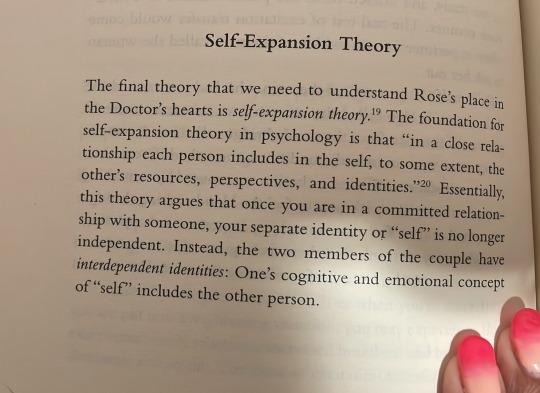
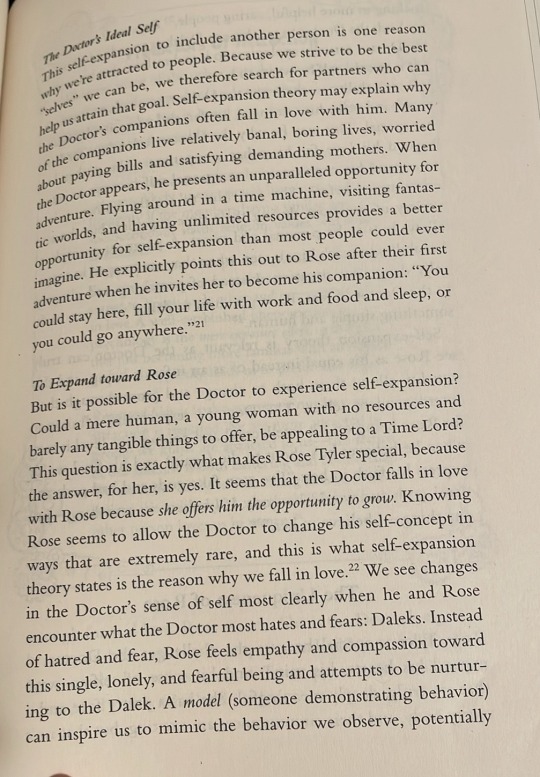
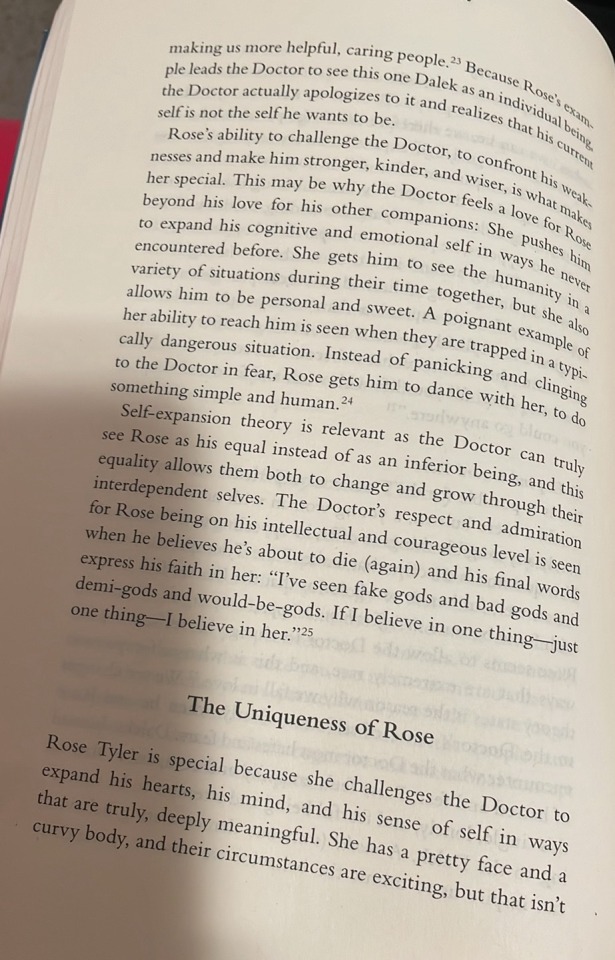
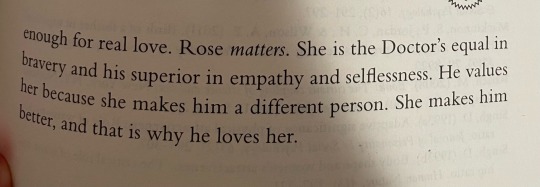
This is part of a book called Doctor Who Psychology and this particular chapter is by Dr. Wind Goodfriend who is a social psychologist and university lecturer who has written multiple textbooks of her own, including one on intimate relationships. Needless to say, if anyone knows who the most impactful companion the Doctor ever had was, it would be her. There’s also other aspects of the Doctor’s attraction to Rose explained in this chapter, but I felt this was the most important.
#tenrose#doctorrose#doctorwho#tenth doctor#timepetals#doctor who#ninerose#ninth doctor#rose tyler#bad wolf#david tennant#billie piper#social psychology#psychology#science of love
857 notes
·
View notes
Text
You were born to be a sacrifice. When you first exited your mothers womb the oracles decided that would be your fate. They tattooed your hands and forehead so everyone would know.
When you turn twenty, they'll take you to the church, and they'll set you on fire. And then when your body is burned they'll give your ashes for the angels, and the angels and saints will be proud, and bless your community and family with great riches. Or at least that's what they say.
When you were young it didn't seem to mean anything that you were born to die young. Nobody cared, they just saw you as another kid. But it was always there. Adults would ask other kids what they wanted to be when they grew up, but they'd ask you what you would do once you were a ruler in the court of heaven. They'd tell other kids about marriage and sex and having children, but for you that would just be for other people, you'd die a virgin.
And at a certain age, you were removed from school. Because they said you wouldn't need it. That you shouldn't be wasting your time on such things. And you didn't understand, but you understood that all your freinds were upset that they wouldn't see you anymore. Not as much at least. And people talked about you so much differently from then on. You weren't complimented as strong, or as smart, or as ambitious, you were pretty, and pure, and brave, and dutiful. And everyone talked about how proud they were of you, how wonderful it was that you were going to die for them.
They were so nice to you. They gave you so many gifts and jewelry. You got to spend all day inside playing video games, and you got the best toys and got to go to movies and plays when you wanted to. Soldiers in power armor would bow when they saw you, and robots and cyborgs would turn off their lights. And you sat at a special place in church, and the clothing you wore was diffrent then everyone else's. And people talked about how wonderful you were, and how pretty you were, and how much they loved having you when they knew you wouldn't be on this world for long. And they were so proud of you when they showed you the platinum clothing you would wear on the day of your sacrifice. And you didn't understand why but all of the compliments sounded sad.
As you grew older things changed. The other children went through puberty, but you didn't, they gave you surgery to prevent it, ans told you how pure you were for not producing blood or seed. And you were old enough to understand that you would die, that you would burn, and it would hurt, and that nobody really knew for sure what happened after peopled died. And you saw a sacrifice, and saw the pain they were in, and there weren't any angels, there were only priests watching and chanting, and the smell of burning skin.
Your parents and family started to care much more how you behave. To make sure you're polite. To make sure you're a good sacrifice, who the angels will like. And meanwhile while all your other freinds are going to college, and talking about becoming artists, or starship pilots, or scientists, you know you'll only ever have one ending. But still, everyone loves you, and you don't have responsibilities, but still sometimes you think about how much diffrent life would be if you were born differently.
You've started meeting people who've left the faith, or people who didn't grow up in it, people who believe in diffrent religions or in no religion at all. And your heaven seems less and less certain every day. According to imperial law you're allowed to be sacrificed, but if you choose not to they can't force you. But if you choose not to you can never be a part of your faith again, and your family will be disappointed in you forever. All your family and community, everyone who you ever knew, will consider you a failure, a coward doomed to hell for not going through with what the cosmos planned for you. And all that pride and joy they felt about your fate would be replaced with anger that you never became what they were so happy and proud about you being. You don't think you believe in heaven anymore, but you still might choose to die, if it means they're proud... it's what you're raised to do, you don't know who you'll be if you choose to leave.
Better choose fast darling, it's only a few months away now. You don't want them to be upset.
#196#worldbuilding#writing#my worldbuilding#my writing#scifi worldbuilding#scifi writing#science fiction#science fantasy#sci fi writing#sci fi worldbuilding#anti christianity#sci fi#science fiction writing#original fiction#short fiction#flash fiction#short stories#short story#original story#dystopian#dystopia#dystopic#psychological horror#religious trauma#apostate#human sacrifice#religious imagery#tw religious themes#tw religious trauma
492 notes
·
View notes
Text
"One of the saddest lessons of history is this: If we've been bamboozled long enough, we tend to reject any evidence of the bamboozle. We're no longer interested in finding out the truth. The bamboozle has captured us. It's simply too painful to acknowledge, even to ourselves, that we've been taken. Once you give a charlatan power over you, you almost never get it back."
- Carl Sagan
#quotes#human rights#wisdom#psychology#philosophy#superstition#beliefs#science#education#reading#truth#facts
452 notes
·
View notes
Text
Saturn has 83 moons. 63 moons are confirmed and named, and another 20 moons are awaiting confirmation of discovery and official naming.
This is their dynamic visualization while they travel with Saturn through space
#physics#astronomy#science#quantummechanics#quantum mechanics#stoicism#society#psychology#ethics#morality
1K notes
·
View notes
Text

One reason humans find it so hard to achieve happiness is due to "prevalence-induced concept change" — as life improves and bad experiences decrease, your brain starts making less severe experiences feel worse than they would have before.
#happiness#psychology#brain#concept change#perception#emotions#adaptation#life#experiences#negative#human#behavior#research#science#adjustment
205 notes
·
View notes
Text
Writing Notes: Tactics of Persuasion
Phantom dreams
Story-telling
Tailored pitches
Source credibility and authority
Social consensus and social identity
Scarcity
Information control
Self-generated persuasion
Commitment
The rationalization trap
Phantom Alternative
An option that looks real, is typically superior to other choices, but is unavailable (Pratkanis & Farquhar, 1992).
The key to selling a flimflam (i.e., the selling of pseudoscience, fringe science, and other questionable claims) is to sell the phantom as real and possible and something that can be obtained with the right belief, effort, and, of course, money, but, in reality, it is a false dream.
The sale of a phantom begins by creating ostensible solutions to satisfy our most basic needs and desires.
As such, phantoms often purport to provide things such as:
Health (quack cures, diets, “healing” rituals, mental health pseudoscience, psychic surgery, faith healing).
Wealth (get-rich-quick schemes, lucky lottery numbers, investment fraud).
Social popularity (weight loss regimes, love potions, dating and romance fraud, becoming an “expert” with “secret” knowledge about UFOs, the Loch Ness Monster, and the moon landing).
Fear of death and the end of our existence (séances, life-after death claims).
Reduction in the anxiety of life’s uncertainties (advice given by horoscopes, astrology, psychic mediums, and other means, phrenology, psychic detectives, conspiracy theories that “make sense” of the world and the desires and feelings of those who spread them).
It is relatively easy to create a phantom since it does not actually need to solve these needs, but just appear to do so.
Compounding the problem, it’s often difficult to spot the real from the fake course of action without the needed knowledge, expertise, and critical thinking skills.
Although a phantom dream is imaginary, its impact on our behavior is quite real.
Story-Telling: The Invented Ruse
To allay our concerns, the seller of flimflam invents a ruse or story to make the fake look real (Bell & Whaley, 1991; Clark & Mitchell, 2019)
A good narrative:
helps to guide our thoughts (e.g., the cure is natural and traditional),
determines the credibility of information (e.g., as a natural cure, this makes sense), and
ultimately directs evaluation and choice (e.g., it works for Native Americans and Quakers, why not me?).
As such, stories cement information in our mind and tend to persist even in the face of strong, discrediting information (Anderson et al., 1980; see Pratkanis (2007) for the use of stories in influence).
Tailored Pitches
Fake healers can use the technique of pre-show to gather needed information.
For example: Before the healing event, attendees can fill out prayer cards with their healing requests and other information.
During the service, the fake healer can call out names and appear, by purported divine intervention, to know the person’s illness and personal life story.
Typically, the fake healer will “cure” shills (plants who fake illnesses) and those with painful health problems for which the pain can be overlooked in the excitement of the moment. The prayer cards (along with Googling and social media) provide the needed information.
Source Credibility and Authority
Two of the most robust research findings in social psychology are as follows: (a) we tend to listen to those who are credible (expert and trustworthy) sources (Hovland et al., 1953); (b) we tend to obey authorities (Milgram, 1974).
The merchant of flimflam leverages these 2 basic human tendencies by creating a persona as a credible authority and then using that persona to hawk a phantom.
Social Consensus and Social Identity
Flimflam merchants will use our social relationships to sell their phantoms by employing the influence tactics of social consensus and social identity.
When we see other people doing something, we are more likely to do the same through the conformity created by social consensus – if everyone is doing it, it must be the right thing to do.
Social consensus engages 2 psychological processes that promote conformity (Deutsch & Gerard, 1955):
information or social proof (“if other people are doing it, it must be correct”; Cialdini, 1984) and
normative influences or social pressure to agree or go along with the group (“I don’t want to be different from the group”; Asch, 1951).
The seller of flimflam will manufacture a false consensus (or take advantage of an apparent one). Quack remedies, astrological readings, unproven Covid treatments, get-rich schemes often feature testimonials of people who speak to the “value” of the product.
Once we become engaged with a flimflam, it can provide us with a desired social identity or a sense of who we are based on our reference group memberships, whether they be real or aspirational (Abrams et al., 1990; Kelley & Volkart, 1952; Tajfel, 1981).
Scarcity
Another social influence tactic to make a flimflam look desirable is to make it look scarce (Cialdini, 1984).
Given that phantoms are generally rare, this is rather easily accomplished.
As an effective social influence tactic, scarcity:
plays on a rule in our head, “if it is rare, it must be valuable”;
creates a sense of urgency and panic that we need to act now and feeling of frustration (reactance) when we do not obtain the phantom; and
inflates our feelings of uniqueness and self-worth when we obtain something that is rare (Pratkanis, 2007).
Information Control: False Accusations, Projection, and Doubt Campaigns
The sellers of flimflam often encounter scientists, journalists, magicians, lawyers, informed citizens, and other “do-gooders and crusaders” who use evidence and reason to point out false claims made in selling the phantom.
If left to stand, these criticisms can cut into sales and deflate the entire scheme. As such, the flimflam merchant needs to control the information environment and can do so using at least 3 techniques:
First, the peddler of a flimflam can falsely accuse the critics. Such attacks can be effective because it can result in a negative impression of the target of attack, undermining their reputation (Wegner et al., 1981). In addition, such allegations set up a chilling, coercive effect as others may become fearful of speaking out.
A second information control tool for the flimflam merchant is a variant of the false accusation known as the projection tactic – accusing others of the misdeed you are doing (Rucker & Pratkanis, 2001). In research, we find that a projection attack: (a) focused attention on the accused and away from the person making the accusation, (b) increased the blame placed on the target of projection, and (c) decreased the culpability of the accuser, making the accuser look good and moral for raising such issues. The effects of projection persisted despite attempts to raise suspicions about the motives of the accuser and providing evidence that the accuser was indeed guilty of the deeds.
A third approach to controlling the information environment is through a doubt campaign (Michaels, 2008; Oreskes & Conway, 2010). The purpose of a doubt campaign is not to convince someone of something (say, the value of the flimflam) but instead to raise doubts and confusion about the facts with the goals of (a) making it difficult to know the truth, (b) creating the impression that there is a controversy (when there is little or none), and (c) forestalling any action until the “controversy” is resolved. The doubt campaign was pioneered in the 1950s and 1960s by tobacco companies seeking to dissuade consumers that their products were harmful, but now is used to create doubt and confusion on such issues as climate change, the efficacy of vaccines such as those preventing childhood illnesses and COVID-19, the value of masks for limiting the spread of COVID-19, and evidence against various conspiracy theories.
Self-Generated Persuasion
One of the most effective means of influence is to have the target generate arguments in support of a position and thereby persuade her- or himself (Boninger et al., 1990; Lewin, 1947).
Self-generated persuasion is effective because in essence it asks the target to think up good reasons for a proposition and to refute any counter argument.
This self-generated message comes from a source that is considered credible, trustworthy, respected, and liked – ourselves.
Commitment
In order to establish continued advocacy and use of a flimflam, the seller needs to secure a commitment, especially a public one, from the target.
With a public commitment, a person is linked to a behavior or course of action – in this case, advocating for and using a flimflam.
Breaking this binding produces a negative tension of not living up to one’s promises and a concern that one will look inconsistent and untrustworthy (e.g., a need to save face). As such, securing a commitment increases the likelihood that the target will comply and perform that behavior (Brockner & Rubin, 1985; Salancik, 1977; Staw, 1976).
Commitments are strongest when the behavior is public/visible, irreversible, and perceived to be freely chosen.
One method for securing a commitment is through the use of the foot-in-the-door tactic (Freedman & Fraser, 1966).
Flimflam is rampant on social media, and we can easily see why.
Social media, with its emphasis on engagement (liking, reposting, posting, commenting, posing, arguing) provides many opportunities to make public, irreversible, and freely chosen commitments (as well as to allow those commitments to be used to create the appearance of social consensus as to the value of the flimflam).
While making a commitment increases compliance, it also results in perhaps the most important ingredient in selling a flimflam: setting a rationalization trap.
The Rationalization Trap
Once a person is sold on a flimflam, and especially when he or she comes to purchase and publically advocate for the phantom option, it changes the way a person processes information.
No longer is the goal “to find things out” but instead to defend and justify the beliefs and actions in what can be called a rationalization trap (Festinger, 1957; Pratkanis & Shadel, 2005; Tavris & Aronson, 2007).
When a person holds 2 discrepant thoughts, what social psychologists call cognitive dissonance, it results in an aversive tension state with painful implications for the self.
In such a state, we are highly motivated to reduce the dissonance.
Of course, one way to reduce the dissonance is to admit a mistake – I was wrong about the cure – and to take responsibility for one’s actions by alerting others and rejecting or, at least scrutinizing more carefully, the source of the disinformation about the quack COVID-19 treatment.
While a mature response and what science requires (Feynman, 1985), it is often difficult to take this route to dissonance reduction, especially when we have made public commitments, self-generated arguments, and linked our social identities to the flimflam, in this case, the quack cure.
Admitting a mistake often is taken to mean – to ourselves and to others – that we are not a good and capable person.
After all, we were unable to see through the deception and then told others to do something that might damage their health.
Unfortunately, an all-too-often course of action is to dig in our heels further and to rationalize and justify our behavior.
Some common ways to do this include:
deny the evidence (“the data showing the ineffectiveness of the cure is made-up”),
take some irrelevant aspect of the disagreeable research and pretend that it is damning (“the study was only done in New York”),
derogate the source (“that’s from the biased media and the doctors’ union”),
derogate others who expose the quackery (“nurses and doctors don’t care about people”),
perform a selective information search (search out and spread any study or claim no matter how unreliable that supports one’s position),
keep repeating discredit research as if it is true, bolster one’s own self and one’s intuition as a way of knowing (“I can see through the media; I did my research unlike those duped by big pharma”),
derogate other forms of knowing, particularly science and reason (“science is a limited way of knowing unlike my intuition”),
use whataboutism (“what about the time Fauci might have said something wrong”),
seek external justification (“a cure that might work is better than having to wear a mask”), and, perhaps worst of all,
self-censorship of putting ourselves in an information bubble where we only hear agreeable information and anything disagreeable is either not heard or ridiculed.
Obviously, a rationalization trap is a very effective means of selling a flimflam.
Once we are in the trap, we will continue to buy the flimflam and advocate for the phantom option in an attempt to justify ourselves in the face of failing evidence.
A key component of being an active truth-finder is to have a plan for evaluating and making decisions about claims.
When we do make a mistake, the honorable thing to do is to admit the error and take responsibility for our actions.
Source ⚜ Reading Scientific Articles ⚜ False Claims ⚜ Writing Resources PDFs
#persuasion#psychology#writeblr#writing reference#literature#writers on tumblr#spilled ink#dark academia#writing prompt#creative writing#science#communication#writing inspiration#writing resources
254 notes
·
View notes
Text
By the way, when I say that I really do believe that we will make it, I am 100% saying that as someone who has been following good news extensively + basically daily for over two years now, and has come to that conclusion slowly and deliberately, based on extensive available evidence. It's not a platitude. I genuinely do mean it, and I could write you a whole dissertation on all the reasons why.
(you know. if I had the time and an in-progress doctorate. rip.)
#worth emphasizing that I am NOT a scientist#but I do have years of experience working in science communication#which is weird to say tbh#partly because we also did a lot of things that weren't science (or were more indirectly science)#and partly because psychology is so often considered not a science or not a “hard science”#but technically my professional specialty literally is mental health and Evidence Based psychology#anyway#not news#me
705 notes
·
View notes
Text
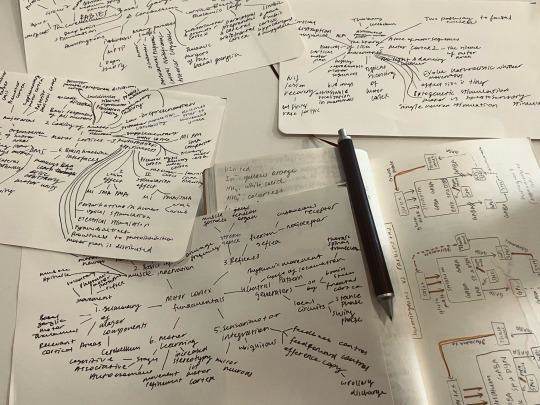
Yeah man ofc u can borrow my notes (if u can read them)
#chaotic notes#chaotic studyblr#study notes bc i cant draw often bc college is mean#stem studyblr#stem academia#stem aesthetic#stemblr#stem#study aesthetic#studyinspo#stem student#study blog#studyspo#study motivation#study notes#studyblr#chaotic academic aesthetic#chaotic academia#psychology notes#neural science#mind maps#too many mind maps#fountain pen#pencil#messy notes
631 notes
·
View notes
Text
Being lonely isn't just associated with physical and mental health issues during waking hours. New research by a team of US scientists links our sense of loneliness to our nightmares, affecting us even while we're fast asleep. The researchers found bad dreams can increase in frequency and intensity when people are lonely, potentially as a result of the added stress caused by the lack of strong social bonds.
Continue Reading.
414 notes
·
View notes
Text
In case someone has told you otherwise: Science is not an ideology.
Science refers to the different fields of knowledge that emerge through using a particular model of discernment known as the scientific method.
Simply put, the scientific method is a formal process of doing experiments and seeing what happens. We fuck around, find out, and then fuck around some more based on what we found out. This lets us figure out what things are and how they work.
The drive behind science is curiosity. We have a natural desire to understand the phenomena around us and invent new things. It doesn't beget the need to believe in anything, just to observe things and see what happens when we mess with them.
Treating science as some kind of religious doctrine is how we get Scientism, which is not science.
Scientism takes scientific content and dumps it into a Christian cognitive framework, treating scientific conclusions as doctrines to abide by rather than as an interpretations of gathered data.
This is where eugenics comes from.
2K notes
·
View notes
Text
The scientists of today think deeply instead of clearly. One must be sane to think clearly, but one can think deeply and be quite insane.
Nikola Tesla
101 notes
·
View notes